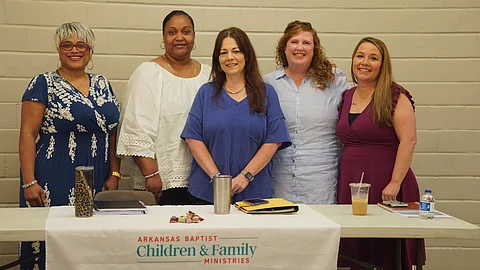
- Home
- Topic Areas
- Newsletter
- Podcast
- 100 Families Initiative
- About
- Connect
- Restore Hope

To recognize Foster Care Month, the 100 Families Initiative of Drew County is spotlighting the importance of foster care—not only to honor the families who open their hearts and homes, but also to explore how each of us can contribute to a child’s journey toward healing and hope. In a recent panel discussion, community partners came together to break down the foster care process, dispel common misconceptions, and cast a shared vision for a stronger local response to the needs of children in care.
Panelists included:
Betsy Anderson, County Coordinator, The CALL in Southeast Arkansas
Veronica McGhee, County Supervisor, Division of Children and Family Services (DCFS)
Regina Hawkins, Resource Supervisor, DCFS
Ellen D. Grace, Regional Coordinator, Connected Foster Care & Adoptions
Veronica McGhee explained how children enter the foster care system, often due to neglect, abuse, or the incarceration of a parent. “We go in and do an assessment of the family, to see if we can possibly put in some services to maintain a child in the home. But if we can’t, then we have to remove the child,” she said.
After a child enters care, the team works quickly to bring the family together and explore a plan for reunification. McGhee emphasized the importance of keeping children close to their home community, but noted that Drew County currently only has three traditional foster homes.
Connected Foster Care, a private agency affiliated with Arkansas Baptist Children and Families, currently operates five homes in Drew County—including four on a campus reserved for large sibling groups. “We do have lots of sibling groups from other counties placed here because they at all times have to have four or more siblings in their home,” said Ellen Grace.
From initial background checks to in-home consultations and licensing assessments, Regina Hawkins outlined the steps involved in approving a foster home—especially relative or “fictive kin” placements.
“We do 65% at the time,” Hawkins shared. “That’s our preference.”
The need for community involvement in both recruitment and support was echoed throughout the discussion.
“We partner with churches,” said Grace. “Most families will tell you they either knew someone in foster care or just felt the call from the Lord.”
Anderson added, “Proximity to other foster families… is probably the number one recruitment tool.”
When asked about common concerns from prospective foster families, panelists pointed to fears around attachment, finances, and trauma-informed care.
“People say, ‘I would get too attached,’” Anderson noted. “That attachment… is exactly what that child needs for the healthy development they need to catch up on.”
Grace added that training and support help families manage the unknowns. “You will have people come in and out of your life, and you learn from them as much as they learn from you.”
McGhee acknowledged that reunification remains challenging. “We have had some success stories… but when you’re dealing with families on drugs and with mental health [issues], it’s real hard.”
Support doesn’t end once a child is placed. From mental health counseling to “resource family support systems,” the panel emphasized the importance of wraparound care for both foster children and caregivers.
“We walk alongside [families],” said Anderson. “You never know what the first step is—buying Christmas gifts one year, and ten years later becoming a foster parent.”
Grace shared that Connected provides support through coaching, respite homes, community support groups, and even mental health services for biological children in the home. “If the family’s not healthy, then the children’s experience is not healthy.”
The panel ended with a call to action: get involved, share the need, and be part of the solution. Whether that means opening your home, supporting a foster family at church, or volunteering your time, every role matters.
“These are Arkansas’s children,” McGhee said. “Help take care of them. Be that family member—even if you don’t know them.”
As the 100 Families Initiative of Drew County continues to cast a wide net of awareness, the hope is clear: more local homes, more community support, and more healing journeys for children in care.
https://www.abcfm.org/connected-families
Learn about more ways you can get involved by visiting: https://everychildarkansas.org/
Smart Justice is a magazine, podcast, and continuing news coverage from the nonprofit Restore Hope and covers the pursuit of better outcomes on justice system-related issues, such as child welfare, incarceration, and juvenile justice. Our coverage is solutions-oriented, focusing on the innovative ways in which communities are solving issues and the lessons that have been learned as a result of successes and challenges.
The podcast is available on all major podcasting platforms.
Subscribe to the Smart Justice newsletter.
